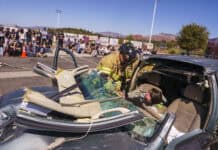Social drinkers may want to think twice before ordering another glass of wine — it could land them in the clink. New Arizona DUI laws crack down on individuals who choose to drink and drive with mandatory jail time and installation of an ignition interlocking device.
Larson Newspapers
Social drinkers may want to think twice before ordering another glass of wine — it could land them in the clink.
New Arizona DUI laws crack down on individuals who choose to drink and drive with mandatory jail time and installation of an ignition interlocking device.
“There’s a lot bigger ramifications,” Sedona motor officer Karl Waak said.
The new law stipulates for the lowest level DUI — blood alcohol content of 0.08 percent or higher — offenders are required to spend one to 10 days in jail and install an ignition interlock device.
For a first-offense extreme DUI — blood alcohol content of 0.15 percent or higher — an individual faces up to 30 days in jail and a court order to install an ignition interlocking system.
Super-extreme DUIs — blood alcohol content of 0.2 percent or higher — carry a 45-day mandatory jail sentence and installation of an ignition interlock device.
An ignition interlocking device is designed to make it impossible to start a vehicle before the driver blows into a breathalyser. They cost around $1,000 and require regular maintenance.
Sedona Police Department Cmdr. Ron Wheeler said the new law gives law enforcement penalties to further discourage drinking and driving.
“The laws are giving the officer and court more teeth in putting the clamp down on DUIs,” Wheeler said.
Prior to Sept. 19, jail time could be suspended at a judge’s discretion and an ignition interlock wasn’t always required.
“It’s not ‘pay your fine and run anymore,’” Wheeler said.
With the clamp closing down tightly, Wheeler said more people are likely to fight offenses in court. Mandatory jail time and the expense of an ignition interlock may prompt more people to challenge citations.
So, SPD has to be ready to defend accusations, Wheeler said. Video cameras will be installed in all patrol cars and on motorcycles.
SPD is also moving away from the traditional breathalysers to determine blood alcohol content.
According to Wheeler, the Intoxilyzer 8000 — SPD’s breathalyser — is usually attacked when someone is challenging a DUI. SPD hopes to move strictly to blood draws to stop this defense.
“You got blood,” Wheeler said. “The results are harder for defense attorneys to challenge.”
Currently, few SPD officers are certified to draw blood from arrestees, but Wheeler said more will attend future classes.
SPD also plans to increase patrol to find those subject to the law.
“It’s a problem that is not going away,” Wheeler said. “Our DUI numbers should be going down, but they’re going up and not just here, all over the state.”
Since the new law took effect, SPD has made 12 DUI arrests.
A new motor unit with two motorcycle officers focuses strictly on traffic violations, which can lead to DUI arrests.
SPD also received a grant for more DUI task force operations. In the past, SPD conducted task forces during major holiday weekends, but now it has funding to arrange them more often, according to Wheeler.
The next SPD DUI task force is scheduled for Thanksgiving.
Trista Steers can be reached at 282-7795, Ext. 124, or e-mail to tsteers@larsonnewspapers.com




















